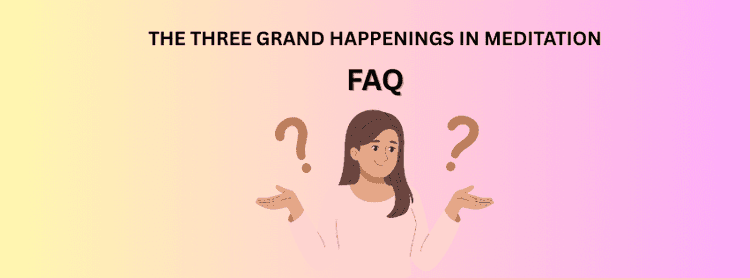FAQ2: The Three Grand Happenings

Q1. What really happens when I meditate sincerely?
You experience three inner shifts:
- Thoughtlessness (Nirmal Sthiti) — the mind becomes still.
- Energy flow — cosmic energy enters and clears blockages.
- Expanded awareness — you feel deep peace, clarity, or even astral travel.
Q2. Is it normal to feel sensations like tingling or swaying during meditation?
Yes. These are signs that cosmic energy is flowing through your energy channels (naadis), clearing blockages and realigning your system.
Q3. What is Nirmal Sthiti, and how do I reach it?
Nirmal Sthiti means a state of thoughtlessness. It comes naturally when you observe your breath regularly. No force is needed — just gentle awareness.
Q4. Can meditation really heal the body and mind?
Yes. Meditation slows brainwaves, reduces stress hormones, and activates healing in the nervous system. Science supports this too.
Q5. What is cosmic energy, and how do I receive it?
Cosmic energy (Prana/Chi) enters through the Brahmarandra at the crown of your head and flows through 72,000 naadis. Meditation opens this flow.
Q6. What is astral travel, and is it safe?
Astral travel is when your consciousness feels free from the body. It’s a natural experience in deep meditation and happens only when you're ready.
Q7. Do I need to chase these experiences?
No. These are gifts, not goals. Like a flower blooming, they come with sincerity, patience, and daily practice.
Q8. I am not able to see anything in meditation. Am I meditating in the right way?
Answer: Yes, you are meditating in the right way. Meditation is not about seeing visions, colors, or dramatic inner landscapes. It is about being — being present, being still, being aware.
Q9. When I do meditation, I feel I am sleeping. Is this normal?
Answer: Yes, this is a very common and natural experience. Meditation gently shifts the brain into slower wave patterns — similar to the early stages of sleep. If you feel like you "lost track of time" or entered a space where you were neither fully awake nor fully asleep, you may have touched the state of Yog Nidra.
Q10. What is yoga nidra? is it a state of healing?
Yog Nidra is a deeply restorative state where the body sleeps but the awareness remains subtly present. Yoga Nidra is widely recognized as a state of deep healing for the mind, body, and soul. The healing occurs by activating the parasympathetic nervous system, or the "rest and digest" mode, which counteracts the stress-induced "fight or flight" response
Q11. How can I access past lives through meditation?
Answer: Accessing past lives through meditation is not about forcing visions — it is about entering a state of deep receptivity, where the soul gently reveals what is ready to be known. This process is sacred, subtle, and often symbolic.
Q12 I’ve been meditating for six months, but my mind is still full of thoughts. Is something wrong?
Answer: Not at all. The presence of thoughts during meditation is completely normal — even for seasoned practitioners. Meditation is not about eliminating thoughts, but learning to observe them without attachment.
Q13 I feel uneasy when I meditate. Is this normal?
Answer: Yes, it’s more common than you might think. Uneasiness during meditation is often a sign that deeper layers of emotion, memory, or energy are beginning to surface. Meditation doesn’t suppress discomfort — it gently reveals what’s been hidden beneath the noise.
Q14 Sometimes I stop meditating for a few days. Is that okay?
Answer: Meditation is a journey of inner conditioning. If the practice is broken, the mind tends to revert, and you may feel like starting from scratch. That’s why regularity is key. Don’t overthink it — just sit, breathe, and let the practice flow naturally. Discipline without mental resistance leads to transformation.
Q15: After meditating, my sleep disappears. What should I do?
Answer: Meditation can awaken inner alertness, making sleep feel distant. Shift your practice earlier, use grounding rituals like journaling or herbal tea, and try sleep-based meditations like Yoga Nidra. Your body will soon find its new rhythm.
Q 16 I’m unable to meditate regularly because I don’t have enough time. What should I do?
Answer: Even 5–10 minutes a day can create deep impact. Meditation isn’t about duration — it’s about consistency. Try linking it to an existing habit (after waking, before sleep, post meals). When breath becomes part of your rhythm, time makes space for it.
Q17: I had an out-of-body experience and stopped meditating. What should I do?
Answer: Out-of-body experiences (OBEs) during meditation are natural and often arise when the mind becomes deeply still and awareness expands. While they can feel unfamiliar or intense, they are not harmful. If it felt overwhelming, pausing was wise. Now, return gently — with grounding breathwork, shorter sessions, and a calm intention
Q18: I felt someone’s presence around me during meditation and stopped out of fear. What does it mean?
Answer: Feeling a presence is not uncommon in deep meditation. It may be your heightened awareness sensing subtle energies, inner guides, or simply your own expanded consciousness.
Q19: Why is it said to drink water before and after meditation?
Answer: Drinking water before meditation keeps the body hydrated and supports mental clarity. After meditation, it helps re-ground your energy and flush out toxins released during deep relaxation — especially through urination